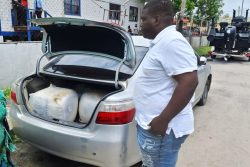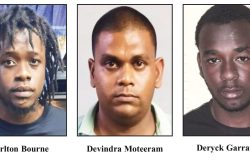What happened prior to the official declaration of results yesterday was both unnecessary as well as undignified. Either Messrs Donald Ramotar and Bharrat Jagdeo are in denial, or they believe they are the lords of the universe and can stop the march of time. At this stage of the world’s planetary existence it was a foregone conclusion that eventually they would have to confront the inevitable, and that Mr Ramotar would be obliged to drive off into the sunset in the direction of his East Coast residence. This does not mean that the PPP does not have the option of going to the courts now that Gecom has officially spoken. That route is via an Elections Petition, and in the past the PPP has routinely advised the PNC to follow it when they in their turn objected to poll results.
As the week progressed, the two above-mentioned PPP spokesmen in particular, worked themselves up to making an allegation of a prior countrywide conspiracy on the part of the coalition in conjunction with some Gecom workers to deny the party its legitimate majority. This is so utterly ludicrous, that one has to wonder whether the men making it have lost all capacity for reason. It is simply not possible for anything on that scale to have been organized by any party, and, it might be added, kept secret; or for observers of all kinds, including those based in Gecom, not to notice systematic irregularities encompassing all the regions of Guyana. One might have thought too that it would have occurred to Mr Ramotar that anyone set on a fraudulent election is going to arrange things so they get more than a one-seat majority.
Freedom House unsurprisingly produced nothing much in the way of hard evidence to support their statements, and Gecom Chairman Steve Surujbally told the media that the 21 Statements of Poll cited by the PPP/C as defective had been found to have no errors when checked. Prior to the official declaration this had not deterred the party from asking for the ballots in all 2299 ballot boxes to be recounted. Were they hoping Florida ‘hanging chad’ style, that the spoilt ballots might generate enough votes to allow them to overtake the coalition’s lead? What exactly were they expecting? And when, as would have inevitably happened had a full recount occurred, they had discovered that the outcome of the general election remained unchanged, exactly what would they have done? Just where precisely, did they think this obstructionist strategy and unconscionable delay would lead them? In other words, what, in their minds, was the end game?
If it was to keep President David Granger and the APNU+AFC government out of office, then it was not realistic, and as they found out about 1 o’clock yesterday, it failed utterly. All that they succeeded in doing was keeping students at home, since nervous parents did not want to send them to school; prolonging the stress the public was feeling − something that was particularly hard on schoolchildren sitting exams; and in the city, at least, closing down businesses for days. This must be one of the few countries in the world where election day is a holiday, and where commercial activity ceases for an entire working week until results are announced. Whatever else this country is, it is not a modern democracy.
In the process, the PPP managed to stubbornly resist calls to concede from organisations like the Private Sector Commission, the Indian Arrival Committee and the lawyers associations, among others. In fact, there was a chorus of voices from all kinds of sources, including one of the PPP’s own candidates and Ambassador to Kuwait Dr Odeen Ishmael, to phone Mr Granger and congratulate him. Certainly the heads of the Western foreign missions here made their position clear, indicating their confidence in the vote count. It still leaves unanswered the question as to what motivated Freedom House to ignore such tremendous pressure, some of it from people and organisations either affiliated or sympathetic to them. It simply conveys an impression they presumably did not intend, namely, that they had something to hide.
And then there were the observers. One didn’t have to know anything about foreign relations to realise that once every observer team had declared the election free and fair, and the results credible, the international community would accept it without further question. Yet here were senior members of the party with considerable diplomatic experience between them insisting that the OAS, Unasur, the Commonwealth, Caricom and the Carter Center were, in effect, all delusional. Are we to conclude that Freedom House only takes observers seriously when they find a victory for the party? This in particular will not do the reputation of the PPP any good in the outside world; it will attract the kind of opprobrium – albeit maybe at a lower level − which was once the province of the PNC.
Particularly unfortunate, perhaps, was the slur cast on the honesty of Gecom employees, who have been accused by Messrs Ramotar and Jagdeo of fraud on the basis of no evidence whatsoever. And while APNU+AFC as a political entity is in a different category, it still does the PPP no credit to try and perpetuate the same allegations of rigging after the election that it had made public before it. Is the idea to make the accusations stick, so that when the next poll rolls around, the party will trot these out as an example of the continuation of ‘PNC history’?
In his farewell address to the nation yesterday, Mr Ramotar did not retreat from his position. “Once again,” he told citizens, “we are being removed from office, not from the will of the people, but by electoral manipulations.” It was both indecent and highly irresponsible for the former president in this way to send out the message to PPP supporters that APNU+AFC is not a legitimate government, and it opens the door for resentment against the new administration to rear its head. Is this the road the PPP intends to take? In a kind of sotto voce fashion to tell its supporters to be recalcitrant and uncooperative? Whatever the case, it is just another example of encouraging divisiveness between the major groups.
For all of that, this poll is a kind of watershed in our political history. Firstly, it tells the PPP that the reliance it has always placed on its ethnic numbers to win elections is now misplaced, and that in future it will have to behave more like a traditional political party in order to win over hearts and minds from various groups (not just Amerindians) to secure a majority.
Secondly, it tells core PNC supporters (as opposed to APNU) that a democratic vote can remove the PPP from office, that in earlier days was seen as undefeatable because of its demographic superiority. They now have a vested interest in the democratic process which was tenuous at best before. Hopefully, with Gecom reform, general elections in this country can take on a more commonplace quality in future, with governments being voted out without drama and bitterness.
As for Mr Ramotar and Mr Jagdeo in particular, they perhaps should be reminded of something which was said about Nick Clegg, the Liberal Democrat leader in the UK. The party lost 49 seats in the general election held four days before ours, largely because it had gone into coalition with the Conservative Party following the previous election. It was Boris Johnson, the Tory Mayor of London and now an MP as well, who first said that Britain owed Nick Clegg a debt. He had taken his party into the previous coalition, said Johnson, knowing there would be a price to pay. And as it turned out that price was high. But what he had done, said the Mayor, was to put country before party for the sake of stable government. It is high time for Mr Ramotar and those of his associates who think like him, to put country before party.








